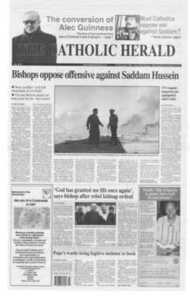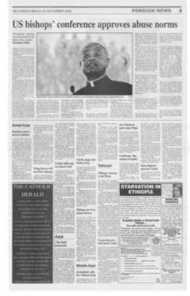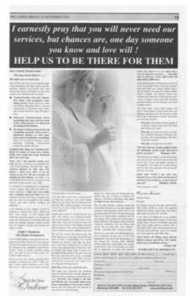Page 7, 22nd November 2002
Page 7

Report an error
Noticed an error on this page?If you've noticed an error in this article please click here to report it.
Tags
Share
Related articles
Why Guinness Is Good For You
Alec Guinness
The Face Behind The Face We Love
Four Darlings Of The Gods Celebrated In Prose And Pictures
Hot On The Heels Of Lanky Texan Model Jerry Hall's
The conversion of Alec Guinness
In the first of two extracts from his new biography,
Garry O'Connor recounts
how Alec Guinness came to the Catholic faith
The English theatre in the 1930s had been dominated by a freemasonry of actors and directors which resulted in certain tendencies. Whatever dilemmas he had over who he was, Alec chose another path: religious conversion.
A true believer in Christianity, such as Alec was to become, would consider not that he chose God and Jesus to follow, but that he had been chosen. That archetypal conversion of St Paul was not a matter of Paul's choice. It happened to him. It is easy to question or niggle at Alec's conversion if you are intent on finding loopholes in it. Psychological causes, reductive reasons, such as that it brought to him emotional security, that he found a mother at last (he was born illegitimate and felt resentment towards his mother, who drank and cadged money off him) can be advanced.
Nevertheless conversion is an action with fundamental consequences in any person's life. Many who have written about Alec's conversion do not take it seriously, considering it perhaps on a par with joining the local bridge club or acquiring a time-share holiday home in the future life.
The signs, in Alec's own deliberate steps towards conversion to the Roman Catholic faith, were clear ever since he was a young man. As a schoolboy he had sung hymns with images of twilight or geography, Greenland's icy mountains — either melancholy or rumbustious. When confirmed as an Anglican in Holy Trinity Church, Eastbourne, by the Bishop of Lewes, he had realized with a flash of insight that he had never really believed in God.
He befriended Cyril Tomkinson, an Anglican priest, who told him that as Hamlet he crossed himself incorrectly, and later he stayed with him in Bristol for four nights during the Blitz. Tomkinson plied Alec with Algerian wine fortified with port and tried to make him, during his stay, confess to him. Alec found him "entertaining, witty, eccentric, rather oldmaidish in a naughty way".
Also in the early years of the Second World War, on one Sunday morning, he had risen in the dark to bicycle to church for Holy Communion; but again, his enthusiasm for Anglo-Catholicism felt to him, in spite of the effort he made, in decline. On the other hand he had "odd, almost mad, phases of near-psychic experience, too"; once, in his search for a meaning in life, he sought enlightenment among the Buddhists.
In 1945 there was the leave weekend from service in the Royal Navy spent in Rome and when he met Pope Pius XII he commented that he felt that for the first time in his life he had seen a saint. Another time, he wandered into Brompton Oratory, London. Spotting a screwed up piece of paper at the feet of the statue of St Anthony, and overcome with curiosity, he furtively snatched it up, read it and returned it to its place. He felt humbled by the simple plea he found. "Please, St Anthony, help me to find work".
As he neared 40 certain professional and personal threads were pushing him towards a more extraordinary outcome to the crisis of middle-age that many people experience. Already, playing Father Brown in France provided the strange mystical experience when he was mistaken for a real priest by a child. Then Matthew, his only child, aged 11, was struck down with polio and paralysed from the waist down. Walking back from filming in Hammersmith one day, Alec dropped in at the Catholic Church and made a negative bargain with God; if Matthew recovered he would never put an obstacle in his way should Matthew wish to become a Catholic.
Matthew did recover and at the age of 15 Matthew chose to become a Catholic. In the meantime the conversion of Alec proceeded slowly: in 1955, having by now played in the stage success of The Prisoner, Alec visited a Trappist monastery where he took a retreat.
There had been a sacrificial feeling about the time in 1952 when he played Hamlet, which had been a failure. It certainly seemed here as if he had been offering himself up to be mauled, inviting the world to participate in tearing him apart and causing him pain.
Hamlet had resulted in other bad cases of cold feet. He abandoned a number of high-flying theatrical projects involving figures as variously distinguished as Edwige Feuillere and Tallulah Bankhead. He renounced his ambition to play King Magnus in The Apple Cart, a role for which he lacked the Shavian brazenness or panache, yet could have imbued with irony, poise and regal nonchalance.
Yet the sense of failure contributed to his conversion. If he was a victim, he was now ready to embrace the Christian idea that the greatest and most important man of all was powerless in his moments of victory. The readiness was all. And at least, in this production of Hamlet, he frivolously consoled himself, he had crossed himself the right way round.
Conversion takes many forms. Some of these, as described in the sceptic William James's Varieties of Religious Experience, are sudden and dramatic, impulsive and compelling — one's whole future life is revealed in a flash and the path which is to be followed is illuminated. This had sometimes seemed to happen to Alec during these years of uncertainty when he had not yet fully committed himself. In the middle of one afternoon he was walking up to Kingsway, for example, "When an impulse compelled me to start running, with joy in my heart and in a state of almost sexual excitement." He ran until he came to the little Catholic church (St Anselm and St Cecilia) which he had never entered before. "I knelt, caught my breath, and for 10 minutes was lost to the world."
It was typical of the man's ever watchful intellectual censor that he should have to justify this deranged — or so he called it — zeal some few lines later, by saying that Ronald Knox, the eminent Jesuit, also had such extreme lapses and had found himself running on several occasions to visit the Blessed Sacrament. He needed authentication, even in his virtues as in his vices. "And so I hide my weaknesses in great reputations," said the Michel de Montaigne he was ever so fond of quoting.
Alec secretly received instruction in 1955 and was confirmed privately by the Bishop of Portsmouth early in 1956. The day of his conversion, 24 March, was sunny and hot; the ceremony took place at St Lawrence's Church, Petersfield, with Fr Henry Clarke officiating. One might raise an eyebrow at his godfather, Peter Glenville, who now shared his bed with a younger man in New York, and would be considered by the Church as living in a grave state of sin. In the News Chronicle of 31 March, 1956, under the somewhat disparaging headline "Guinness turns Catholic", Alec spoke out a little cagily about playing Father Brown and the Cardinal, "My research work for the parts certainly made me go into the subject of Catholicism a bit more than I had before."
The inference behind the defensive answer could have been that there was something rather dark and shameful about becoming a Catholic, and that Alec's "excuse" was that of being an actor and so he could not help it. Nearly 30 years later, on the first page of Blessings in Disguise, he would write, "Poor, rich, exceptionally brilliant Peter Sellers never seemed to get himself sorted out" — in other words "There, but for the grace of God, go I." When he had confessed to his superior officer in the Navy that he was an actor, "You automatically got the sneer." An actor, again from Blessings is usually no more than "an assortment of odds and ends which barely add up to a whole man." Catholics, like actors, were a bit beyond the pale, decidedly outside the mainstream.
Alec, sincere as he was, joined up at the highest level of Catholic snobbery, again needing authentication. Yet in Alec's paradoxical way his was a sincere conversion and it had a sound intellectual resonance which was to last. He enjoyed, too, and identified with the retreats — the stays in convents or monasteries, the mysticism of the profound Catholic thinkers — and of course the formality and sensuousness of the ritual.
Merula, his wife whom he married in 1938, became a Catholic convert a few months later when Alec had started filming The Bridge on the River Kwai in Ceylon (now Sri Lanka). It came, or so he claims, as a complete surprise to him: "I had no idea she was receiving instruction. If I had known I would probably have opposed it, for fear she was doing it only to keep me happy."
In his posthumous appraisal of Merula, Alan Bennett paid tribute to her nun-like devotion to Alec. "The truth was that she made him a nicer, less awkward, more accessible person but even after 60 years of marriage she still found it odd that they got on and that she could cope with his fussing and overpropriety." What practical effect did Catholicism have? "Deep down, our faith has made a great difference to our lives", Alec told the Daily Mail in 1959. "Merula takes some cripples out in the car once a week. And I don't swear as much as I used to." A frivolous but suitable response. A year later he would muse (in the Standard) that Catholicism "seems such
an eminently reasonable way of living; it is so sensible. The very opposite of the puritanical."
Alec always felt that actors had an affinity with priests — "unfrocked" priests, he called them, "because clearly they were not priests, nor had they a sacramental role to play, yet there was still something priest-like about them, a sense of evocation and a sense of ceremony". He believed that his fellow actors Olivier and Richardson possessed these qualities, and now several priests came to be numbered among his personal friends, among them Fr [Philip] Caraman. Alec, naturally, considered himself unworthy of the company of the other distinguished Caraman converts such as Graham Greene. Evelyn Waugh, Edith Sitwell — part of the elaborate good manners of his constructive deceit? He reflected later that it must be quite a burden to "carry" that lot in his mind. He found Father Caraman sweet-natured, very sophisticated, as well as extremely determined.
Later, at Easter 1994, a day after his 80th
birthday, Alec rejoiced in his attendance at Pope John Paul II's Easter Mass, held amid thunder, lightening and pouring rain outside St Peter's. In My Name Escapes Me, Alec celebrated the aspect of high farce worthy of an Ealing comedy ("A thousand white, starched coifs, which half an hour before looked like a great aggressive Armada, went limp and the nuns fell silent without a shot being fired"), followed by impressive dignity (His Holiness's voice, "the most beautiful and dignified speaking voice I have ever heard").
Guinness's conversion brought peace and comfort to his restless and searching self. It conferred unification.
It may come gradually, or it may occur abruptly; it may come through new intellectual insights, or through experiences which we will later have to designate as "mystical". However it comes, it brings a characteristic sort of relief; and never such extreme relief as when it is cast into the religious mould.
(William James, The Divided Self) Would the conversion prove to be lasting? Many priests remained for Alec essences, their influence absorbed through the words they had written — chief among them Teilhard de Chardin: "The incommunicable part of us is the pasture of God". Conversion enabled Alec to come to terms with the disablement, the withdrawal of promised glory everyone feels in growing up, but which in his case was extreme.
Extracted from Alec Guinness, The Unknown: A Life (Sidgwick and Jackson) £18.99 Next week — part II: The temptations of Alec Guinness; and his final days.
blog comments powered by Disqus















